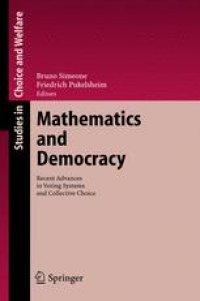
Ebook: Mathematics and Democracy: Recent Advances in Voting Systems and Collective Choice
- Genre: Mathematics // Applied Mathematicsematics
- Tags: Economic Theory, Game Theory/Mathematical Methods, Game Theory Economics Social and Behav. Sciences, Political Science
- Series: Studies in Choice and Welfare
- Year: 2006
- Publisher: Springer-Verlag Berlin Heidelberg
- Edition: 1
- Language: English
- pdf
From the reviews:
"The … book is an edited volume, and exhibits both the flaws and virtues of that genre. … I found the book interesting and important. … the book is well worth having on your shelf. … It would be useful, in fact, as a classroom exercise for students in a variety of disciplines, because it both illustrates the unnatural power of mathematics to illuminate hard questions and unites several apparently unrelated problems in a single analytic rubric. … this is a valuable and important book." (Michael Munger, Public Choice, Vol. 132, 2007)
"This is a fine collection of 17 papers chosen from contributions to the International Workshop on Mathematics and Democracy: Voting Systems and Collective Choice that took place in Erice, Sicily in 2005. … one will walk away from this volume with the sense that one has been exposed to the research frontier of the electoral system theory." (Ugur Ozdemir, Social Choice and Welfare, Vol. 31, 2008)
The study of Voting Systems and Collective Choice lies at the crossroad of social and exact sciences. The former ones focus on the development of electoral systems in the context of the changing needs of societies; the latter ones deal with the formal study of electoral mechanisms, whose underlying axioms reflect universal principles such as equity, representation, stability, and consistency.
In this book, Different quantitative approaches to the study of electoral systems have been developed: game-theoretic, decision-theoretic, statistical, probabilistic, combinatorial, geometric, and optimization ones. All the authors are prominent scholars from these disciplines. Quantitative approaches offer a powerful tool to detect inconsistencies or poor performance in actual systems. Applications to concrete settings such as EU, American Congress, regional, and committee voting are discussed.
The study of Voting Systems and Collective Choice lies at the crossroad of social and exact sciences. The former ones focus on the development of electoral systems in the context of the changing needs of societies; the latter ones deal with the formal study of electoral mechanisms, whose underlying axioms reflect universal principles such as equity, representation, stability, and consistency.
In this book, Different quantitative approaches to the study of electoral systems have been developed: game-theoretic, decision-theoretic, statistical, probabilistic, combinatorial, geometric, and optimization ones. All the authors are prominent scholars from these disciplines. Quantitative approaches offer a powerful tool to detect inconsistencies or poor performance in actual systems. Applications to concrete settings such as EU, American Congress, regional, and committee voting are discussed.
Content:
Front Matter....Pages i-xii
Power Indices Taking into Account Agents’ Preferences....Pages 1-18
The Sunfish Against the Octopus: Opposing Compactness to Gerrymandering....Pages 19-41
Apportionment: Uni- and Bi-Dimensional....Pages 43-53
Minimum Total Deviation Apportionments....Pages 55-64
Comparison of Electoral Systems: Simulative and Game Theoretic Approaches....Pages 65-81
How to Elect a Representative Committee Using Approval Balloting....Pages 83-95
On Some Distance Aspects in Social Choice Theory....Pages 97-104
Algorithms for Biproportional Apportionment....Pages 105-116
Distance from Consensus: A Theme and Variations....Pages 117-132
A Strategic Problem in Approval Voting....Pages 133-150
The Italian Bug: A Flawed Procedure for Bi-Proportional Seat Allocation....Pages 151-165
Current Issues of Apportionment Methods....Pages 167-176
A Gentle Majority Clause for the Apportionment of Committee Seats....Pages 177-188
Allotment According to Preferential Vote: Ecuador’s Elections....Pages 189-204
Degressively Proportional Methods for the Allotment of the European Parliament Seats Amongst the EU Member States....Pages 205-220
Hidden Mathematical Structures of Voting....Pages 221-234
A Comparison of Electoral Formulae for the Faroese Parliament....Pages 235-251
Back Matter....Pages 253-255
The study of Voting Systems and Collective Choice lies at the crossroad of social and exact sciences. The former ones focus on the development of electoral systems in the context of the changing needs of societies; the latter ones deal with the formal study of electoral mechanisms, whose underlying axioms reflect universal principles such as equity, representation, stability, and consistency.
In this book, Different quantitative approaches to the study of electoral systems have been developed: game-theoretic, decision-theoretic, statistical, probabilistic, combinatorial, geometric, and optimization ones. All the authors are prominent scholars from these disciplines. Quantitative approaches offer a powerful tool to detect inconsistencies or poor performance in actual systems. Applications to concrete settings such as EU, American Congress, regional, and committee voting are discussed.
Content:
Front Matter....Pages i-xii
Power Indices Taking into Account Agents’ Preferences....Pages 1-18
The Sunfish Against the Octopus: Opposing Compactness to Gerrymandering....Pages 19-41
Apportionment: Uni- and Bi-Dimensional....Pages 43-53
Minimum Total Deviation Apportionments....Pages 55-64
Comparison of Electoral Systems: Simulative and Game Theoretic Approaches....Pages 65-81
How to Elect a Representative Committee Using Approval Balloting....Pages 83-95
On Some Distance Aspects in Social Choice Theory....Pages 97-104
Algorithms for Biproportional Apportionment....Pages 105-116
Distance from Consensus: A Theme and Variations....Pages 117-132
A Strategic Problem in Approval Voting....Pages 133-150
The Italian Bug: A Flawed Procedure for Bi-Proportional Seat Allocation....Pages 151-165
Current Issues of Apportionment Methods....Pages 167-176
A Gentle Majority Clause for the Apportionment of Committee Seats....Pages 177-188
Allotment According to Preferential Vote: Ecuador’s Elections....Pages 189-204
Degressively Proportional Methods for the Allotment of the European Parliament Seats Amongst the EU Member States....Pages 205-220
Hidden Mathematical Structures of Voting....Pages 221-234
A Comparison of Electoral Formulae for the Faroese Parliament....Pages 235-251
Back Matter....Pages 253-255
....